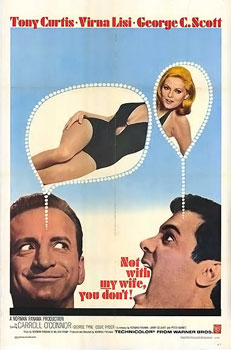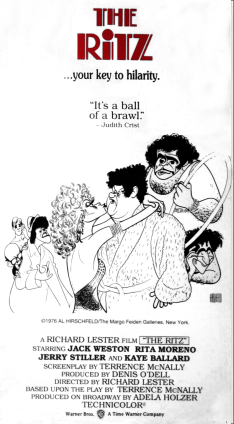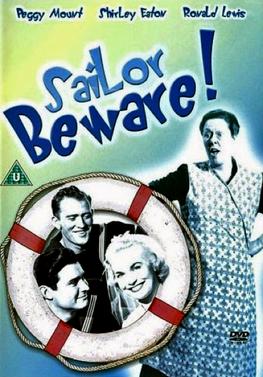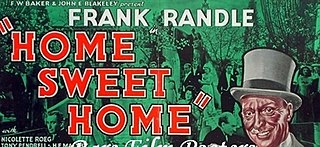
Jerry Lewis was an American comedian, actor, singer and humanitarian who was famously nicknamed "The King of Comedy", with a career lasting over eight decades. He appeared in more than 59 motion pictures, including the first sixteen films with his partner, singer Dean Martin, during their act as Martin and Lewis.

Boeing Boeing is a 1965 American bedroom farce comedy film based on the 1960 French play Boeing-Boeing and starring Tony Curtis and Jerry Lewis. Released on December 22, 1965, it was the last film that Lewis made for Paramount Pictures, which had produced all of his films since My Friend Irma (1949).

Jacqueline Pearce was a British film and television actress. She was best known for her portrayal of the principal villain Servalan in the British science fiction TV series Blake's 7 (1978–1981), a performance which her obituarist in The Times wrote produced "a sexual awakening for a generation of sci-fi fans".
Walter Scharf was an American musician, best known as a film, television and concert composer and arranger/conductor.

The Sad Sack is a 1957 American comedy film based on the Harvey Comics character of the same title, created by George Baker. The film stars Jerry Lewis and Peter Lorre and was released by Paramount Pictures.

Three on a Couch is a 1966 American comedy film directed by Jerry Lewis and starring Jerry Lewis and Janet Leigh.
David Sinclair Whitaker was an English composer, songwriter, arranger, and conductor who was most active in the 1960s and 1970s.

Hook, Line & Sinker is a 1969 American comedy film produced by and starring Jerry Lewis. This was the final film for director George Marshall, whose career dated back to 1916, and Lewis' last film for Columbia Pictures.

Not with My Wife, You Don't! is a 1966 American comedy film starring Tony Curtis, Virna Lisi and George C. Scott. The film was nominated for a Golden Globe for Best Motion Picture – Musical/Comedy. The plot follows the standard storyline of the long-running "road movies" popularized by Bob Hope, Bing Crosby and Dorothy Lamour, also products of the Norman Panama-Melvin Frank writing team.

The Ritz is a 1976 British-American comedy farce film directed by Richard Lester based on the 1975 play of the same name by Terrence McNally. Actress Rita Moreno – who had won a Tony Award for her performance as Googie Gomez in the Broadway production – and many others from the 1975 original cast, such as Jack Weston, Jerry Stiller, and F. Murray Abraham, reprised their stage roles in the film version. Also in the cast were Kaye Ballard and Treat Williams. The film, Jack Weston, and Rita Moreno all received Golden Globe nominations in the comedy category. It opened to mixed reviews.

Dry Rot is a 1956 British comedy film directed by Maurice Elvey, and starring Ronald Shiner, Brian Rix, Peggy Mount, and Sid James. The screenplay is by John Chapman, adapted from his 1954 Whitehall farce of the same name.

Up the Creek is a 1958 British comedy film written and directed by Val Guest and starring David Tomlinson, Peter Sellers, Wilfrid Hyde-White, David Lodge and Lionel Jeffries.

Sailor Beware! is a 1956 British comedy film directed by Gordon Parry and starring Peggy Mount, Shirley Eaton and Ronald Lewis. It was released in the United States by Distributors Corporation of America in 1957 as Panic in the Parlor.

Keep It Clean is a 1956 British black-and-white comedy film directed by David Paltenghi and starring Ronald Shiner and Joan Sims.

The Gang's All Here is a 1939 British black-and-white comedy-mystery, directed by Thornton Freeland and starring Jack Buchanan and Googie Withers. It was produced by Associated British Picture Corporation and released in the U.S. in 1943 as The Amazing Mr. Forrest.

Home Sweet Home is a 1945 British musical comedy film directed by John E. Blakeley, written by Roney Parsons and Anthony Toner, and starring Frank Randle, Nicolette Roeg and Tony Pendrell. Set in the fictitious town of Redvale, the film is largely a vehicle for slapstick routines by Randle.

And the Same to You is a 1960 British boxing-themed comedy film directed by George Pollock and starring Brian Rix and William Hartnell. It was written by John Paddy Carstairs, John Junkin and Terry Nation based on the stage farce The Chigwell Chicken by A.P. Dearsley.

The Girl in the Taxi is a 1937 British musical comedy film directed by André Berthomieu and starring Frances Day, Henri Garat and Lawrence Grossmith. It was based on the stage musical The Girl in the Taxi and was part of a trend of operetta films produced during the decade.

The Naked World of Harrison Marks is a 1966 British pseudo-documentary about adult film director and photographer George Harrison Marks starring Marks, Valentine Dyall, Pamela Green and June Palmer.

Girdle of Gold is a 1952 British second feature comedy film directed by Montgomery Tully and starring Esmond Knight, Maudie Edwards and Meredith Edwards.


















